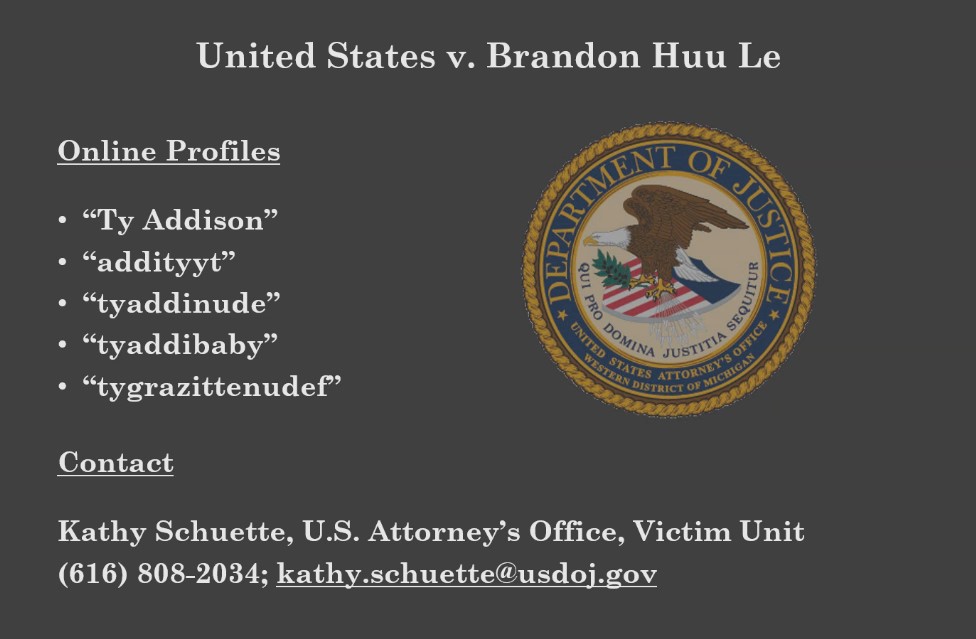
Following the indictment of a Florida for sexually extorting a 13-year old Michigan girl on Snapchat, The FBI and other U.S. officials are warning residents about the increase in sextortion.
In a virtual press conference held Wednesday afternoon, FBI Special Agent James Tarasca said 629 tips about Sextortion cases have been received in Michigan – 483 in 2022 alone. Tarasca said that’s three times as many as were reported in 2021.
Sextortion involves threats against a victim, including threats to publish or distribute private and sensitive information about someone if the victim does not provide the perpetrator with sexually explicit images or videos with sexual favors.
“The rapid rise of sextortion across Michigan [and] across the United States is of course a very deeply disturbing trend,” said U.S Attorney for the Western District of Michigan Mark Totten. “Anyone can be a victim, but this crime especially targets some of the most vulnerable members of our society – teenagers and children. On the enforcement side, we are 100% committed to using every tool that we have to hold perpetrators accountable.”
During the press conference, Totten also announced charges against Brandon Huu Le, 21, of Maitland, Florida for coercion and enticement of a minor, sexual exploitation of a minor, and receipt of child pornography in connection with an alleged sextortion scheme using the popular social media app Snapchat.
The Government alleges that on August 10 and 11, 2019, Mr. Le used Snapchat to contact a 13-year-old girl living in the Western District of Michigan. The indictment alleges that Mr. Le steered the Snapchat conversation to sexual topics; took a screenshot of the sexual portion of the conversation; and then threatened to publicly post that conversation online with the victim’s name if the victim did not provide him with sexually explicit photos and material.
The U.S. Attorney’s Office and the FBI are working to identify other individuals, nationwide, who Le may have approached. The U.S. Attorney’s Office believes that Le used the name “Ty” and the following usernames on various social media, messaging, and e-mail accounts:

Those who believe they may be a victim in this case are asked to visit justice.gov/usao-wdmi/victim-and-witness-assistance-program/vw-large-cases/Le or contact Kathy Schuette, Victim Coordinator, at (616) 808-2034 or kathy.schuette@usdoj.gov.
The FBI is also providing the following tips on how people can protect themselves from sextortion schemes:
- Be selective about what you share online. If your social media accounts are open to everyone, a predator may be able to figure out a lot of information about you.
- Be wary of anyone you encounter for the first time online. Block or ignore messages from strangers.
- Be aware that people can pretend to be anything or anyone online. Videos and photos are not proof that people are who they claim to be. Images can be altered or stolen. In some cases, predators have even taken over the social media accounts of their victims.
- Be suspicious if you meet someone on one game or app and this person asks you to start talking on a different platform.
- Be in the know. Any content you create online—whether it is a text message, photo, or video—can be made public. And nothing actually “disappears” online. Once you send something, you don’t have any control over where it goes next.
- Be willing to ask for help. If you are getting messages or requests online that don’t seem right, block the sender, report the behavior to the site administrator, or go to an adult. If you have been victimized online, tell someone.
Those with information or other victims of sextortion can contact your local FBI field office, call 1-800-CALL-FBI, or report it online at tips.fbi.gov. More information is available at fbi.gov/how-we-can-help-you/safety-resources/scams-and-safety/common-scams-and-crimes/sextortion.






